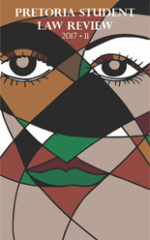Pretoria Student Law Review 2017-11

Pretoria Student Law Review 2017-11
Editor in chief: Sarah Burford
Editors: Simon Botha, Privilege Chanana, Rutendo Chinomona, Roxanne Gilbert, Trisha Jivan, Lethabo Mailula, Agnes Matasane, Raeesah Thomas, Thomas White, Jurgen Zwecker
2017
ISSN: 1998-0280
Pages: 146
Print version: Available
Electronic version: Free PDF available
| File Size: | 1.16 MB |
| File Type: | application/pdf |
| Hits: | 13553 Hits |